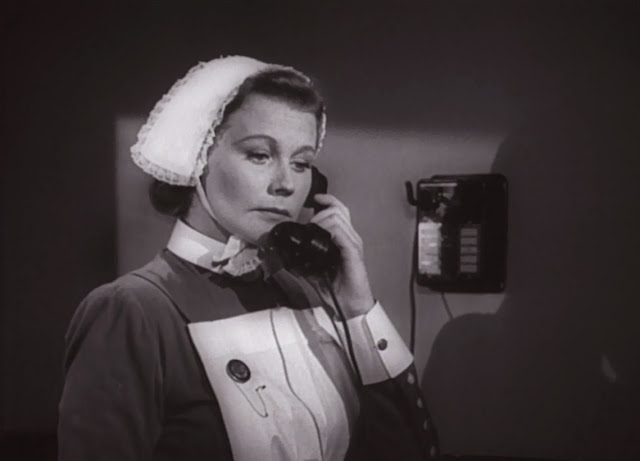The Lamp Still Burns (1943)
 |
| Rosamund Johns |
Here's a rather curious film: It is effectively a propaganda piece, made with the assistance of the Ministry of Health ...
... aimed at encouraging the modernisation of the nursing profession. Produced by Leslie Howard, who died before the film was completed, The Lamp Still Burns, tells the story of a young architect, Hilary Clarke (played by Rosamund Johns) ...
 |
| Rosamund Johns |
... who witnesses an accident and decides that she should become a nurse.
However, following an explosion at a factory she meets factory owner/engineer Lawrence Rains (played by Stewart Granger) ...
 |
| Stewart Granger |
... who she knew from her days as an architect, and the two promptly fall in love.
The love story is only really incidental to the main message: that nurses should not live cloistered lives, should be allowed the freedom to marry, be women with normal lives, and yet continue to be nurses. This conflict between the old and the new is shown from the opening scene when the audience is treated to the exterior of the Rains Engineering Works ...
 |
... which is clean, bright and modern. This is in stark contrast to the interior of the hospital which is dark and forbidding, with strict rules that control the lives of the women who work within. Lawrence Rains is shown as a modern business owner, as comfortable on the factory floor in overalls, working closely with his engineers, as in the boardroom. Eventually it is he who supports the challenge to the rules that restrict the lives of the nurses, appearing before the hospital board to support Nurse Clarke after she faces disciplinary action for a number of offences including drinking on duty:
 |
| Rosamund Johns (centre) & Eric Micklewood (right) |
 |
| Eric Micklewood (left) and Rosamund Johns (right) |
What is strange is that the film is inconclusive: will Nurse Clarke be successful in controlling her instinct to confront authority; will she ever be free to marry Lawrence Rains?
The film has a sense of hopefulness. It digs beneath the harsh front of the senior nurses to show their humanity and is respectful of how they had subverted their femininity in pursuit of their careers. Yet there is a strong message that their world has passed: now is the era of strong women, who should be free to pursue their careers and the personal lives. That the film received the full support and cooperation of the Ministry of Health is an indication that the message was not a challenge to the authorities but a signal that those running the country were looking forward. It comes as no surprise that the film was released just one year on from the 'Beveridge Report' (to which members of the Ministry of Health had contributed) which set the foundations for the creation of the national health Service which revolutionised British health care forever. One cannot doubt that the film makers were making their own contribution towards the argument in favour of health reform.
Other things to note:
The film marked the first appearance of Joyce Grenfell (credited as Joyce Greenfell)in a full-length feature:
 |
| Joyce Grenfell |
 |
| Rosamund Johns & Joyce Grenfell |
She plays a serious character - a successful, young female doctor - a far cry from the scatty comedy character she is perhaps most famously associated with.
Also appearing are Leslie Dwyer (also in The Way Ahead, The Goose Steps Out and I See A Dark Stranger) and Wylie Watson (who also appeared in Brighton Rock, Whisky Galore and London Belongs to Me):
 |
| Wylie Watson (centre) and Leslie Dwyer (right) |
It being a film made in the UK in the 1940s, John Laurie also appears:
 |
| John Laurie & Joan Maude |
One of the senior nurses is played by Joan Maude ...
 |
| Joan Maude |
... who later appeared as one of the members of the 'celestial court' in A Matter of Life and Death.
Another cast member if Margaret Vyness, the Australian actress who was the wife of Hugh Williams (and mother of the British actor Simon Williams who found fame in Upstairs Downstairs)
 |
| Margaret Vyness |
 |
| Margaret Vyness |
This is not a film that I would recommend to everyone, however for anyone interested in the social changes that took place in British society during the 1940s, or the background to the creation of the Welfare State, The Lamp Still Burns provides a fascinating insight into the role of the media in spreading the message in support of the campaign for reform.

No comments:
Post a Comment